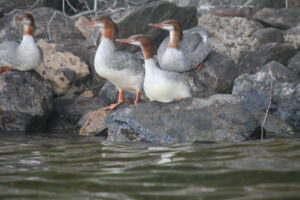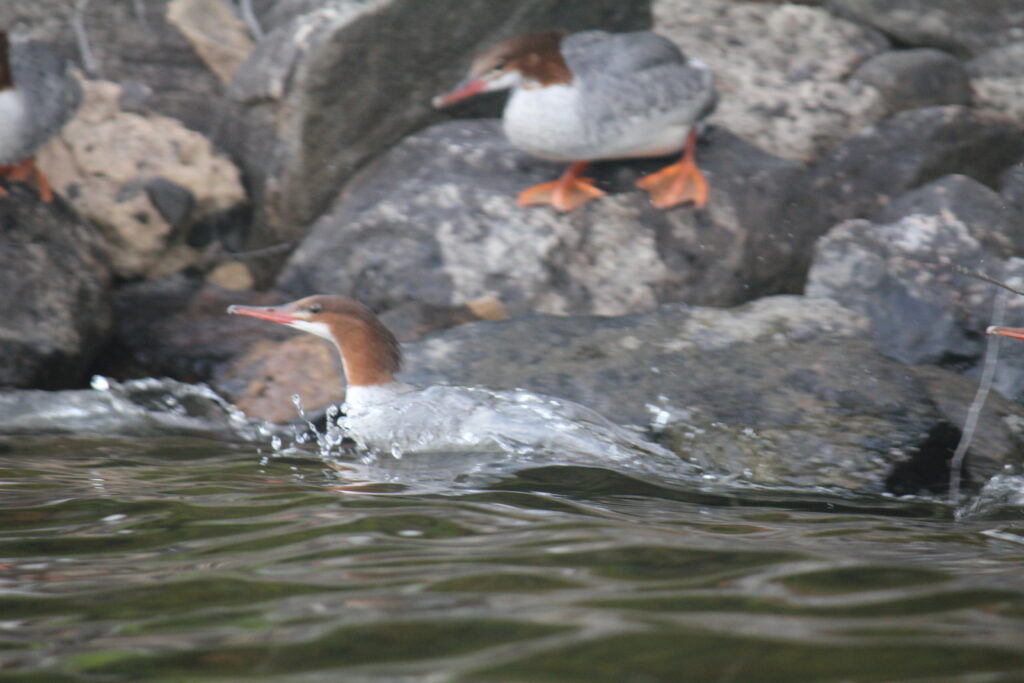A LESSON IN HUMANITY, FROM DUCKS
Paddling my kayak along the granite shore of the lake where I currently reside, I came upon a small group of young merganser ducks. They may, or may not, have been siblings. Mergansers have a characteristic that is common among humans who have the least to share and sadly, often rare among those who have more than enough.
Lost merganser chicks instinctively follow any female who looks like their mother. The hens happily raise any and all who tag along, which helps ensure the survival of their line and by extension, the species.

Compare that to META.
The tech world’s ultimate mother duck is constantly striving to increase the size of its Facebook and Instagram broods by allegedly following founder Mark Zuckerberg’s latest “mission statement”: “Give people the power to build community and bring the world closer together”. That doesn’t, however, include exercising social responsibility if it cuts into profit, even in the short term.
META began blocking news links for users in Canada in protest at a law which allows news organizations to negotiate payment for articles shared on social media platforms.
The long-term validity of that will be decided by lawyers. In the short and fraught term, the conglomerate could have but refused, to lift the ban when wildfires roared across Canada’s Northwest Territories, an area bigger than France, Spain and Portugal combined.
That’s despite the fact that social media is considered key to disseminating news to some 41,000 of the remote region’s 46,000 inhabitants, who follow the CBC Northwest Territories (part of Canada’s national broadcasting network), on Facebook.
Catherine Tait, the president and chief executive of CBC and Radio-Canada accused META of “surgically withholding news and critical information because of a business decision.”
To put that in perspective, META posted revenues of $32 billion for its second quarter of 2023, 11% higher than last year.
My lasting and deepest impressions from every natural disaster I reported on, are the extraordinary examples of how people rise above the worst moments of their lives to save and offer succour to strangers. Those with the least are, as often as not, the ones who share whatever they have, without question or hesitation.
In the devastation wrought by the tsunami that struck Sri Lanka in 2004, we photographed a disconsolate man in a traditional sarong and a tee shirt, wandering aimlessly through the debris that had been his village, cradling his small daughter. Another man standing nearby explained that all the two had left in the world were the clothes they were wearing, and each other. “But it will be alright,” he said. “Only half of my house was destroyed. They will stay with me and my family.”
ON THE OTHER HAND
Juxtapose that with the country that can afford anything money can buy.
In spite of its self-anointment as “Custodian of the Two Mosques” (Mecca and Medina), Islam’s holiest shrines, Saudi Arabia’s leadership has been a distastefully missing in action when it comes to hosting Syrian, Afghan and other refugees and asylum seekers from Moslem countries.
But somehow the regime is spending billions (literally) of its petrodollars to entice greedy golfers to legitimise it, and the world’s best soccer stars to play for the Saudi league’s otherwise middle-ranking at best clubs.
It’s called “sportswashing”, a practice akin to money-laundering, that on a cynical level s a better return on investment than offering a helping hand to the helpless.
Five years after he was declared (sort of) a pariah for ordering the murder and dismemberment of Jamal Khashoggi, a Saudi journalist who dared criticise him, de facto Saudi ruler Mohammed bin Salman (a.k.a. MBS) recently spent nearly a week in Paris meeting with French President Emmanuel Macron.
A chilling report from Human Rights Watch documented that: “Saudi border guards have killed at least hundreds of Ethiopian migrants and asylum seekers who tried to cross the Yemen-Saudi border between March 2022 and June 2023.”
MBS has been invited to make an official visit to London.
In the many recent inundations generated by climate change, ordinary people who were themselves victims used canoes, rowboats and even waded in water up to their chests to find and help others.
That’s what being part of a community means. Those who ignore the concept in favour of profit could reasonably argue that as long as it’s legal, it’s their right to choose how they make and spend money their money.
Equally, it is the right of others to apply the choice of money over the milk of human kindness as a marker on the scale of humanity, and then apply the abductive reasoning: “If it looks like a duck, walks like a duck and quacks like a duck, then it just may be a duck”.

On that scale, surely the best one to emulate is a merganser.
Comments are welcomed. Click CONTACT on the site header.
To receive e‑mail alerts to new posts, Click SIGN-UP on the header.
One thought on “A LESSON IN HUMANITY, FROM DUCKS”
“the more humanity advances,
the more it is degraded”-gustav flaubert
the more META advances the more we are
degraded…META and its kinfolk discussing
the reported physical weight of the once again
indicted former president disregard and
dismiss the more important weight of the
criminal charges brought against him…
ah, the humanity